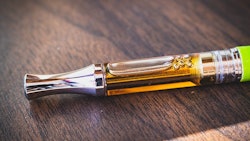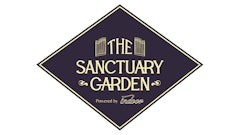
At High Grade Organics, a medical/recreational dispensary in Bend, Ore., owner Nick Harsel is almost—almost—as concerned with offering an aesthetically pleasing environment for customers as he is with providing them the responsibly sourced cannabis they seek. Case-in-point: The artist-turned-dispensary-CEO built the retail location’s wood shelves and displays himself; he even laid the store’s concrete floors.
With jewelers for parents, Harsel admits he’s always been intrigued by art. He went to the University of Oregon to study it, then “moved to new mediums like wood and a little metal stuff,” he tells Cannabis Dispensary. So when High Grade Organics had the chance to move from a previous building to its current location on Davis Avenue, Harsel saw a chance to create the dispensary of his dreams—quite literally. “It was really fun to have something in my head, put what I saw down on paper, and build it out for the shop,” Harsel describes.
His sketches included horizontal strips of light- and dark-stained wood walls, sunset- yellow walls, countertops supported by wooden vertical beams, gray concrete floors, and some skylights bathing High Grade Organics in natural light—with the help of a few carefully placed LEDs.
That was Harsel’s vision for the dispensary, and it was one he built almost entirely by hand.

“It’s been a very freeing experience,” Harsel explains. After all, design can be “something you pay a lot of money for—and it may not be exactly what you want,” he says. By creating the dispensary’s design, he adds, “it's been a nicer experience—on my time line, and the way I want.”
The walls and cabinets were built from discarded pallet wood, obtained for the low cost of $0. “A few breweries give them away for free,” Harsel says, “so we picked them up, broke them down, … sanded and stained them, and fit them together like a jigsaw puzzle.”
That doesn’t mean designing the dispensary wasn’t without its challenges. For example, Oregon law requires that some cannabis products, such as flower, be kept out of the reach of customers. So, Harsel handcrafted glass display cases that roll out like a drawer, so customers can see products, but only a budtender can unlock and pull them out.
“That was a challenging element of the design,” Harsel admits, “trying to figure out how to make our flowers look good without being touchable.” With the glass tops, however, the customers can see more than the buds—they can also read about the flowers’ origins, from where and how they were grown, to their genetic history, potency and more, Harsel says. “Transparency is important,” he says, “and we try to give as much information as possible.”

$0: How much the pallet wood used to build High Grade Organics’ walls and cabinets cost. Harsel picked up the discarded wood from local breweries.
Bringing in the Artists
Yet, these design touches are hardly the only thing that makes High Grade Organics unique.
Last year, the dispensary launched a paraphernalia and merchandise line to accompany and support its supply of cannabis. The store sells cannabis jars, pipes and chillums; canvas and leather bags; and T-shirts branded with the store’s insignia—and each are anything but what you’d expect to see in a dispensary. “We didn’t have any pipes or carrying cases,” Harsel explains, “and the ones that are out there—in this industry at least—have a stereotypical feel.” So, just as he did with the store, Harsel worked to create what he envisioned—beyond what was available.
“I wanted something a little more refreshing, maybe outdoorsy—more like something you might just as easily find in a coffee shop,” he says. “Something that could fit in a living room or kitchen without looking like it doesn’t belong there—something you don’t feel you have to hide away.” So Harsel reached out to local artisans and began working on a new line.

With the help of Abel, a clay maker, and J. Paige & Co., a handbag designer, Harsel customized a line of clay pipes, jars and dishes with signature white and turquoise stripes, and multi-sized bags made from organic canvas and leather. Both artists are local to Oregon, a huge plus in Harsel’s book. “Generally, I think local products have higher quality,” Harsel says.
The largest canvas and leather bag is big enough to fit Harsel’s laptop, and he uses it every day on his commute into work, he says. “It was important to me to have different sizes at different price points,” Harsel says of the bags, which are priced starting at $35.
The clay products can be used for their intended purpose or for decoration. Take the flower plate, for example: The small $20 dish can display flowers or be used as a catch-all for other items, Harsel says. “You could roll something on it,” he says, “or use it as a display plate.”
Since the products launched (and went online about a year ago), they’ve been popular, especially with tourists, Harsel says. More often than not, Harsel finds that the people who are drawn to these artisan products are those who are new to cannabis or traveling from out of state. Part of that is the products’ novelty, and the other is the price point.

“Since the products launched (and went online about a year ago), they’ve been popular, especially with tourists.” Nick Harsel, owner/CEO, High Grade Organics
“They are priced high” compared to non-artisan products, Harsel says, “and they’re not for someone who is trying to save money,” hence the higher number of sales to tourists.
The products have sold as far as New York and several other states on the East Coast, but they haven’t reached overseas yet, Harsel says. The sales are “nothing too wild,” he says, “but it is fun to see the reach we have outside of Oregon and even Colorado or California.”
Next up, Harsel will expand High Grade Organics’ product line and improve its existing products in an effort to provide customers with a unique cannabis-shopping experience.
























